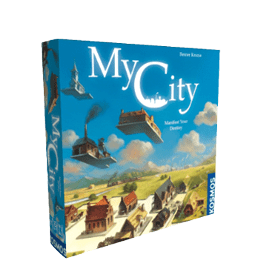Moje Miasto
 Gra składa się z 24 epizodów, począwszy od rozwoju miasta we wczesnych fazach preindustrialnych, a skończywszy na uprzemysłowieniu. Podczas każdej gry gracze dostosowują swoje wrażenia, dodając elementy do swoich osobistych plansz i dodając karty do gry. Wybory i akcje graczy dokonane podczas jednej sesji rozgrywki przenoszą się na następną sesję, tworząc spersonalizowane wrażenia z gry.
Gra składa się z 24 epizodów, począwszy od rozwoju miasta we wczesnych fazach preindustrialnych, a skończywszy na uprzemysłowieniu. Podczas każdej gry gracze dostosowują swoje wrażenia, dodając elementy do swoich osobistych plansz i dodając karty do gry. Wybory i akcje graczy dokonane podczas jednej sesji rozgrywki przenoszą się na następną sesję, tworząc spersonalizowane wrażenia z gry.
Dla graczy, którzy nie chcą doświadczyć Moje Miasto jako gry legacy, dwustronna plansza oferuje alternatywną konfigurację do powtarzalnej gry (niektóre elementy z legacy są potrzebne do powtarzalnej gry, gracze mogą odblokować te elementy grając przez pierwsze 4 epizody).
Liczba graczy: 2 - 4
Czas gry: 43 mn
Złożoność: 2 / 5
Zagraj w Moje Miasto i 1223 inne gry online.
Bez ściągania, bezpośrednio z twojej przeglądarki.
Ze swoimi przyjaciółmi i tysiącami graczy z całego świata.
Darmowe.

Zagraj w Moje Miasto i 1223 inne gry online.
Bez ściągania, bezpośrednio z twojej przeglądarki.
Ze swoimi przyjaciółmi i tysiącami graczy z całego świata.
Darmowe.

Streszczenie zasad
My City is a Legacy game, meaning you can run a series of games, slightly changing the rules and scoring conditions in each game.
If you'd rather not play a series of games (or you've reached the end), you can simply choose Eternal Game, but keep in mind this will spoil some of the surprises and twists in the campaign.
Here's a basic how to play:
Game play
(Construction)
The goal is for your city to score the most points. Each round, a piece will be revealed, and all players put that piece on their city map with the following restrictions:
- Pieces must touch at least one side of a previously placed piece (or the river for the first piece)
- Pieces may not overlap previous pieces or go off the board
- Pieces may not be placed on the large mountain area or large forest area
- Pieces may not cross the river (but may be placed beside it)
Note there may be spaces you want to cover up or not cover up -- see scoring for more details
(Passing)
A player may choose to *pass on constructing a building*, they lose 1 point immediately if they do so.
A player may also choose to *pass on constructing a building and end the episode*, they will not participate in future construction turns but no points will be lost for that final building piece they passed on.
(Additional Rules for Eternal Game)
There are 3 churches (purple roofs), if a player cannot construct them in their city, their game ends immediately and cannot participate in future construction turns.
A blocking card will eliminate the next building piece from this game. All players will remove that piece from play. No points are lost immediately for this occurrence.
Game end
The game ends when all pieces in the reserve have been revealed or when all players have *ended the episode*.
Scoring and assessment then take place.
Scoring (Episode 1)
10 points
-1 point for each city tile passed
-1 point for each visible light green space not filled by a city tile
-1 point per visible rock (so -2 points per visible space with two rocks)
+1 point per visible tree (so +2 points per visible space with two trees)
(There may be different scoring conditions in future games in the campaign)
Assessment of an Episode
At the end of the scoring, depending on how each player is ranked in that episode, each player may gain board stickers and may gain coloured progress symbols.
(There may be different rewards in future games in the campaign.)
Campaign Assessment (End of Campaign)
The player who has the most coloured progress symbols after 24 episodes is the overall winner.
Scoring (Eternal Game)
In game scoring:
- passing on constructing a building: -1 point
- First to build over both gold veins: +3 points
End of game scoring:
- Visible space with trees: +1 point per tree
- Visible space with rocks: -1 point per rock
- Empty light green space: -1 point per empty space
- Number of buildings in each colour group: +? points
- 4 different buildings next to well: +4 points
- 3 colours next to church: +3 points

